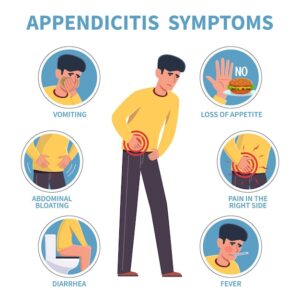
Introduction
Appendicitis is a common yet potentially serious medical condition caused by inflammation of the appendix, a small, finger-like organ attached to the large intestine. If untreated, it can lead to severe complications, such as a ruptured appendix. Early recognition of appendicitis and prompt medical treatment are crucial for preventing complications. This guide will help you understand the warning signs of appendicitis and how it can be treated effectively, ensuring you’re informed and prepared to act when needed.
What is Appendicitis?
Appendicitis occurs when the appendix becomes inflamed, often due to an infection or a blockage. While the appendix has no known vital function, its inflammation can cause significant discomfort and health risks. Appendicitis is most common in individuals between 10 and 30 years of age, but it can occur at any age.
If you suspect appendicitis, seeking medical advice from a trusted gastroenterologist in Surat can make all the difference in ensuring timely diagnosis and treatment.
Warning Signs of Appendicitis
Appendicitis symptoms can vary, but the condition often begins with mild pain near the belly button that worsens over time. Here are the common signs to watch for:
1. Abdominal Pain
- Location: The pain typically starts around the navel and gradually moves to the lower right abdomen.
- Type of Pain: It may feel dull initially and later become sharp and intense. Movement, coughing, or sneezing can worsen the pain.
2. Nausea and Vomiting
- Often, the abdominal pain is accompanied by nausea or vomiting, which may be mistaken for a stomach bug.
3. Loss of Appetite
- A sudden loss of appetite is another common early symptom of appendicitis.
4. Fever
- A low-grade fever may develop initially, which can increase if the condition worsens.
5. Changes in Bowel Habits
- Some people may experience constipation or diarrhea alongside other symptoms.
6. Swelling and Tenderness in the Abdomen
- The lower right part of the abdomen may become swollen and tender to touch.
When to Seek Medical Help
It’s essential to seek medical attention immediately if you experience:
- Severe or worsening abdominal pain.
- Pain that shifts to the lower right side.
- Any combination of the symptoms listed above, especially with fever or vomiting.
Ignoring the symptoms of appendicitis can lead to complications like a ruptured appendix, which can cause a severe infection called peritonitis.
How is Appendicitis Diagnosed?
Doctors rely on a combination of medical history, physical examination, and diagnostic tests to confirm appendicitis.
1. Physical Examination
- The doctor will press on different areas of your abdomen to check for pain, swelling, or tenderness.
2. Blood Tests
- Elevated white blood cell count may indicate an infection.
3. Imaging Tests
- Ultrasound: Often the first choice for diagnosing appendicitis, especially in children and pregnant women.
- CT Scan or MRI: These provide more detailed images and are used to confirm the diagnosis when necessary.
Treatment Options for Appendicitis
The treatment for appendicitis usually involves surgery, but in some cases, antibiotics may be used. Here are the main approaches:
1. Appendectomy (Surgical Removal of the Appendix)
- Laparoscopic Surgery: A minimally invasive option involving small incisions and quicker recovery time.
- Open Surgery: Used in cases where the appendix has already ruptured or infection has spread.
2. Antibiotics
- In very early or mild cases, antibiotics may be used to treat the inflammation. However, surgery remains the definitive treatment.
3. Post-Surgical Care
- After surgery, most patients recover within a few weeks.
- Following your doctor’s advice on rest, diet, and physical activity is essential to ensure a smooth recovery.
Preventing Appendicitis: Is It Possible?
While appendicitis cannot always be prevented, adopting a healthy lifestyle can reduce your risk. Here are some tips:
- Eat a High-Fiber Diet: Include plenty of fruits, vegetables, and whole grains to promote good digestive health.
- Stay Hydrated: Drink plenty of water to maintain regular bowel movements and reduce the risk of blockages.
- Regular Checkups: Routine visits to a stomach specialist can help you stay ahead of any digestive health concerns.
Why Choose a Specialist for Appendicitis?
Choosing a qualified stomach specialist ensures you receive the best care for appendicitis, from accurate diagnosis to expert surgical treatment. The specialists in Surat have extensive experience handling even the most complex cases, ensuring you receive personalized care.
If you or a loved one suspects appendicitis, don’t delay seeking medical advice. Early treatment not only alleviates discomfort but also prevents potentially life-threatening complications.
Final Thoughts
Recognizing the warning signs of appendicitis and acting quickly is critical for a successful outcome. Abdominal pain, nausea, fever, and changes in bowel habits should never be ignored, as they could signal something more serious. With timely intervention, most people recover fully from appendicitis and go on to lead healthy lives.
If you’re in Surat and suspect appendicitis, consult the best stomach specialist for accurate diagnosis and treatment. Trust the experts to provide the best care and ensure your road to recovery is as smooth as possible.
